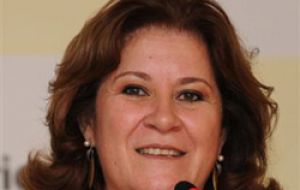MercoPress. South Atlantic News Agency
Brazil to trim budget and fight inflation by eliminating all 2009 stimuli
 Planning Minister Miriam Belchior: “doing more with less resources”
Planning Minister Miriam Belchior: “doing more with less resources” Brazil announces 50 billion Real (30 billion US dollars) cuts from this year’s budget as President Dilma Rousseff seeks to help the central bank contain inflation and lower some the world’s highest real interest rates.
The budget cuts, to be detailed next week, will remove all stimuli implemented in 2009 and 2010 to spur the economy during the global financial crisis, Finance Minister Guido Mantega said in Brasilia. Social programs and investments in infrastructure will be preserved, while new government hiring will be frozen, funding to the state development bank reduced and all ministries forced to trim spending.
Finding ways to do more with fewer resources will be the government’s new “mantra,” Planning Minister Miriam Belchior told reporters. The cuts won’t harm the economy, which will grow 5% this year, Mantega said.
Rousseff has promised to curb spending that increased faster than economic growth under her predecessor Lula da Silva. In a speech opening Congress Feb. 2, she told lawmakers she is committed to “maintaining a macro-economic policy compatible with fiscal balance, a firm control of inflation and rigorous use of public money.”
Inflation quickened to 5.91% last year as record low unemployment and credit growth fuelled the fastest economic expansion in more than two decades. The central bank forecasts Latin America’s biggest economy grew 7.3% in 2010.
Mantega said the budget cuts will deliver an immediate “shot in the arm” of the economy that should allow the central bank to reduce interest rates at an “opportune” moment.
Traders are wagering policy makers will increase the benchmark rate to 11.75% from 11.25% next month as they seek to rein in inflation running at a two-year high. Interest rate futures show central bank President Alexandre Tombini may lift the Selic rate to 13% by year end, according to market estimates.
Brazil missed its fiscal targets last year as Lula da Silva kept in place tax cuts enacted after the collapse of Lehman Brothers Holding Inc.’s in September 2008 and boosted spending in the run up to Rousseff’s election.
Brazil’s budget primary surplus (before interest payments) ended 2010 at 2.8% of GDP, short of the government’s 3.1% target. The IMF in a report last month said Brazil saw a “particularly pronounced” deterioration in its public finances and is expected to miss its 2011 primary surplus target by a “wide margin.”
Mantega said the government would meet its primary target of 117.9 billion Real this year without relying on one-time revenue windfalls or accounting changes as it did in 2010. The target is equal to 2.9% of nominal GDP, which he estimated would reach 4.1 trillion Real. In December Congress approved a primary surplus target equal to 3% of an estimated 3.9 trillion Real in GDP.
As part of the austerity drive, the government will ban the purchase or rental of new properties and also prohibit the buying of new cars, Belchior said.
The central bank, in the minutes to their Jan. 18-19 meeting, said they are counting on a primary surplus equal to 3% of GDP this year to help slow inflation. To meet that goal, Rousseff must slash 70 billion Real from the 2011 budget
A spending cut equal to 1% of GDP would slow inflation by 0.32 percentage points, according to the median estimate in a central bank survey.
Inflation will remain “around” the 4.5% target in the next two years if policy makers increase the benchmark interest rate 150 basis points to 12.25% in 2011 and the Real remains stable, said last December Carlos Hamilton, central bank director for economic policy.




Top Comments
Disclaimer & comment rulesCommenting for this story is now closed.
If you have a Facebook account, become a fan and comment on our Facebook Page!